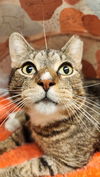Steve Duno (www.1888petmeds.com)
- Azalea
- Bean plants
- Cactus
- Crocus
- Daffodil
- Dieffenbachia
- Hemlock
- Hydrangea
- Ivy
- Lily
- Marijuana
- Mistletoe
- Mushroom
- Narcissus
- Nightshade
- Oleander
- Philodendron
- Poinsettia
- Potato leaves
- Rhododendron
- Tobacco
- Tomato leaves
- Walnuts
- Yew
Though cats are true carnivores, they do sometimes consume vegetable matter, especially in the wild, when the cat consumes its prey's stomach and its contents. Stomach contents of prey animals usually contains partially-digested vegetable matter, which, when eaten by a cat, can provide it with vitamins and minerals not necessarily found elsewhere.
Domestic cats seem to love chewing on and eating plants; why is not completely clear. Several reasons could explain the behavior, however. First, they may be instinctively searching for nutrients not provided to them in their regular diets. Or, some cats may feel the need to regurgitate something disagreeable. Eating enough plant material can have this effect on many cats, who may be trying to dislodge a big hairball, or some other undesirable object. Another possible reason for the plant munching is simply that they like the taste and texture of what they are eating. Just look at the feline obsession for catnip, a perennial in the mint family.
Clearly, this behavior should be minimized, if not only for the loss of the pretty plants, but for the safety of the cat as well. The first step to take is to avoid purchasing plants known to be toxic to cats. Houseplants such as the philodendron, dieffenbachia, and ivy, common in many households, should be either avoided, or hung from the ceiling in such a way as to completely prohibit access by the cat. If she has access to the outdoors, be sure to avoid planting any of the toxic shrubbery or garden plants listed above. Unfortunately, you won't be able to stop her from going over to the neighbor's yard, if she is an outdoor cat. You will have to decide if allowing her this privilege is important enough to put her health at risk.
Locate whatever non-toxic houseplants you have off of the floor, either in tall stands, or from hanging mounts. Plant pedestals should be high, and as narrow as the plant's drainage dish, so as to give the cat no footing whatsoever. Never keep any plants on the floor, or on shelves with easy cat access.
Cover the soil of the plant with marbles or rocks, to discourage digging. Wipe down the plant leaves with a dilute soap and water mixture; it won't hurt the plant, and it will taste terrible to the cat. You can also purchase a veterinarian-approved cat repellant, and apply it to the plant.
Also, try placing double-sided adhesive tape around the area where you keep your plants, in an effort to dissuade her from going near. Try aluminum foil strips as well. If you can catch the cat in the act of chewing on a plant, spray her with water from a plant sprayer bottle.
While discouraging her from going near your prized houseplants, you should simultaneously provide her with some young grass seedlings to chew on as much as she likes. Grow them yourself from grass seed, or purchase them at your local pet store. Place them far from your houseplants, perhaps in the kitchen, near where she eats. When given an alternative like this, most cats will forget about the houseplants entirely.
Lastly, try to keep your cat's environment as stimulating as possible, to prevent boredom, one of the main causes of improper behavior. Lots of toys and objects to investigate, as well as plenty of play time with you, should keep her nose out of your houseplants.


